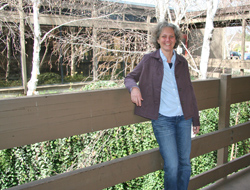 Cheryl Wilcox
Cheryl Wilcox
Cheryl Wilcox, Diablo Valley College math professor since 1996, has taken a personal interest in combating the high price of college textbooks. She is creating a math textbook for DVC’s beginning math course, MATH 075 that will be available for students online and free.
Yes, you read that correctly. Free. A notion inspired by her students.
“The high price of textbooks affects many students adversely,” Wilcox explained. “Some students have to wait for financial aid or a paycheck and are not able to get the book at the beginning of the course. It’s discouraging for them to start behind other students because of these financial considerations. I had prepared some materials for the first few weeks of class so that students could start without a book, and I thought it would be great to expand it so they wouldn’t need a book at all.”
Now Wilcox is on sabbatical leave (the 2010-11 academic year), working to make the book a reality.
“It’s exciting to arrange the course topics according to the way I teach,” she said. “Since I’m not working with a publisher or for a national market, I don’t have to conform to the standards for Texas or Florida, but can emphasize the skills our department has written into our course to prepare our students.”
Wilcox is gratified that she has not encountered any resistance to her project.
“Rather, I’ve received a great deal of encouragement from everyone,” she said. “The department voted a few years back to support the movement to ‘open source’ textbooks, and then last year voted unanimously to endorse my sabbatical project. And when I mention the project to students, they are very positive about it.”
Wilcox is doing all the work on the book herself, though she said she’d like help from the college in posting the final version on a DVC server rather than on her personal website. However, she does intend to register the copyright at Creative Commons and make the final version widely available on the web.
The only thing that worries her about acceptance of the text, she said, is that it does not offer “online homework.”
“Most math textbooks now come with software that generates homework problems that students solve, then enter answers online, so that it is automatically graded and gives immediate feedback,” she explained. “I can’t offer that capability with the book for free.”
But homework there is, and Wilcox said it is designed to provide constant review.
“It’s pretty relentless, really,” she said. “Usually we cover a topic, there is homework that day on the topic, and then it is assumed that students know it and we move on. They don’t see it again until the test. But most people need more time with the concepts than that, and the homework is designed to review the previous five or six lessons every time. There are one or two of each kind of problem over five or six classes, rather than 10 of the same kind on one night.”
Since Wilcox will not make any money from the project (she says doing it while on sabbatical is enough compensation for her), why is she doing this?
“Well, the first thing is to make a free book so students have less financial burden for their education,” she said. “Another is to teach the course the way I think it should be taught.
“I’ve put a lot of emphasis on critical thinking in the book– rare in a basic skills math book, I think,” she continued. “I’ve tried to write it with a sense of humor and practicality. I’ve also emphasized the way math is used all over in day-to-day life, and tried to de-mystify many of the numbers we see around us. I hope that the book inspires an interest in math as well as teaching skills.”
She also has put many web links in the book, “trying to expand students’ knowledge of the incredible variety of educational resources available for free,” she said. “There are links to news articles, to sites with public data such as the U.S. Census Bureau, and to math instruction videos on YouTube. I think the exposure to these resources will help the students turn to them if they are confused on a topic in a future math course.”
Even though Wilcox has not completed the first draft of her book, it is being tested in class this term. Instructors Leslie Month and Jane Brecha, with department approval, are using the book in their Math 075 sections. One instructor posted it on her personal website, and the other has put it in a WebCT for the course.
When the project is finished, Wilcox said, she plans to offer it to other colleges and students. “I hope students and instructors will want to use the book when they hear about it.”

